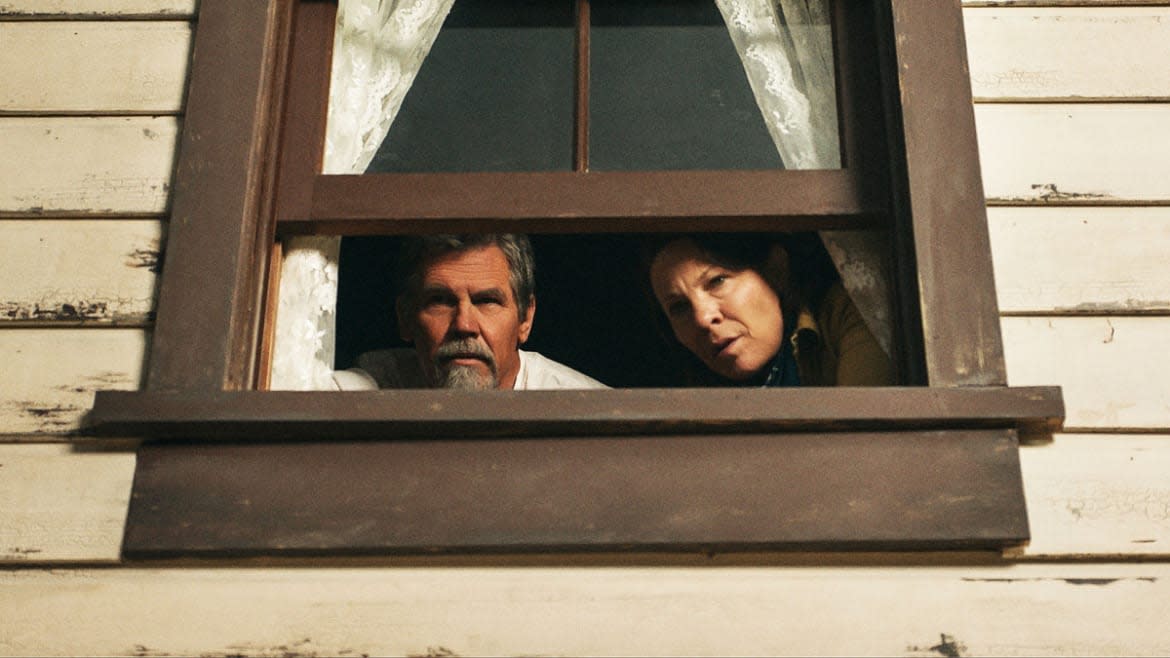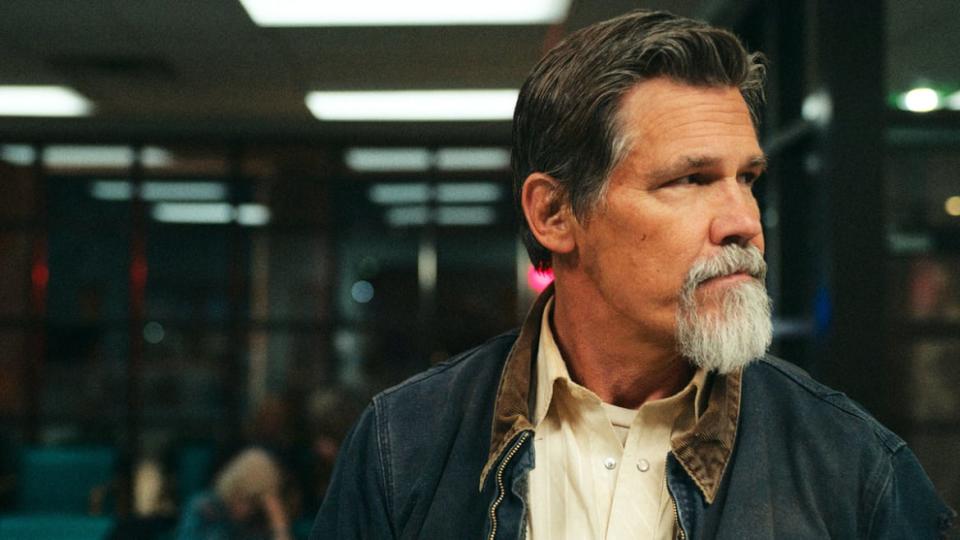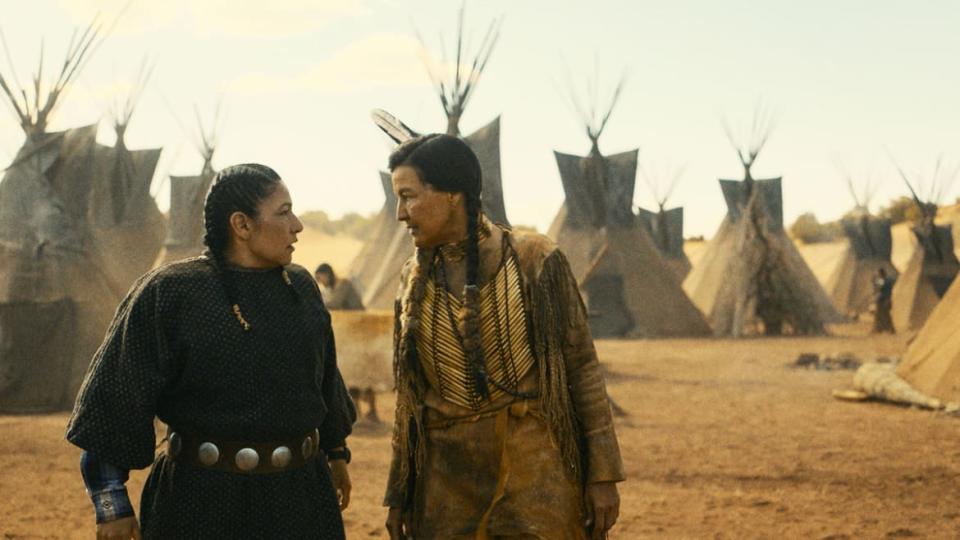‘Outer Range’ Season 2 Is Best Used as Background Noise

As far as ideas created under the almighty eye of the streaming algorithm go, “Yellowstone, but make it science fiction” isn’t a terrible one. The challenge here isn’t blending the Western and sci-fi genres: There’s lots of space for things to get weird in the rural West, as many films and TV series—recently, Jordan Peele’s Nope—have proven. The question is how the “god ‘n’ guns” conservative ethos of the Yellowstone franchise will sit alongside all of the woo-woo “time is a river” bullshit. Awkwardly, as it turns out, which is presumably why Outer Range's second season paradoxically downplays the strangeness while upping the time travel.
Season 1 took its time debuting “the hole,” a portal through time located in the pasture of a Wyoming ranch belonging to the upright, unsmiling Abbott clan. But it got there. Now Schrödinger’s cat is out of the cosmic bag, and people are diving through the dang thing all willy-nilly.
This does further complicate the lives of Royal Abbott (Josh Brolin) and his pious, faithful wife Cecelia (Lili Taylor), who’s as tangled up in all this time-travel hooey as anyone despite never taking a dip in the hole herself. She’s too occupied with repairing her family’s finances and reputation—both compromised back in Season 1—as well as caring for Autumn (Imogen Poots), the backpacker/aspiring cult leader who moves from a campsite on the Abbotts’ land into the family homestead at the beginning of Season 2. The reason for the upgrade? Royal’s convinced that Autumn is actually Abbott granddaughter Amy (Oliver Abercrombie), coexisting as a 9-year-old girl and as a full-grown adult, thanks to the magic of the hole.

Royal Abbott (Josh Brolin).
The younger Amy is missing, and Royal figures that Autumn/Amy can help find her. At first, this seems to be the driving dramatic force of the season. Then it gets washed away in a flood of subplots, set across 150-ish years of Wyoming history. One Abbott son goes back in time and learns some scandalous secrets about the early years of his parents’ relationship. Another is off on a romantic road trip with his best girl when he learns that his niece is missing. Autumn is doing her thing, as are Royal, Deputy Sheriff Joy Hawk (Tamara Podemski), and Dr. Bintu (Yrsa Daley-Ward), a scientist who’s very interested in the snortable time-dust piled up on the Abbotts’ land.
Meanwhile, the hole is just chilling out in that distant pasture, waiting for someone to fall through it. It’s pretty easygoing as far as sci-fi plot contrivances go—no paradoxes or tears in the fabric of space-time, just two simple rules. As established in Season 1, passing through the hole spits a person out in the same spot at an arbitrary point in history, including long before the land became known as “the Abbott ranch.” The random nature of the hole makes it difficult to find someone who’s been sucked into it, and the fact that it opens and closes according to its own mystical whims means that travelers can get stuck in whatever year they find themselves in on the other side. (It is difficult to talk too much about the hole “opening and closing” without a juvenile smirk, thanks for asking.)
That’s what happens to Joy, who nosedives into the hole at the beginning of the season and emerges in 1882, in a world where the genocide of her people wasn’t as far along as it is now. The Native presence is noticeably increased in Season 2 of Outer Range, both in front of and behind the camera. The show doesn’t have much to say about the experience of being Shoshone now or then, however, which makes Joy’s experience just another disparate element in a show that’s full of them.
First Black ‘Doctor Who’ Ncuti Gatwa Injects Life Into Flagging Series
But the biggest swings—and the biggest misses—come when Outer Range tries to imitate the surreal comedy of Twin Peaks, a pastiche that’s confined to subplots involving the villainous Tillerson clan. Patriarch Wayne Tillerson (Will Patton) still lusts after Royal and Cecelia’s land, and younger son Billy (Noah Reid) is still hung up on Autumn. But, for the most part, the Tillersons spend the season indulging in eccentricities that aren’t pushed far enough to make them funny, and the visions they see aren’t quite odd enough to excite.
Dissonance between the elements of Outer Range was a minor issue in Season 1. It becomes a major one in Season 2, where it’s hard to reconcile the series about the Native lesbian cop traveling through time with the one about the conservative rancher trying, and failing, to appeal to good old-fashioned integrity in a world that’s forgotten the meaning of the word. It’s not that these people don’t coexist in real life, in small-town Wyoming or anywhere else; it’s that even when their adventures come together, they still feel siloed.
About a year and a half ago, series creator Brian Watkins was replaced by Charles Murray, who has an impressive resume as a TV producer and showrunner (and, importantly for our purposes, an overall deal with Amazon). Murray has done good work in the past, but red flags of indifference are all over Outer Range Season 2. The flat lighting. The flimsy historical settings. The crude CGI inserts. The cringeworthy performances from the supporting cast. The overall effect is akin to syndicated sci-fi pulp from the mid-’90s—which has a certain shoddy backlot charm but is hardly the prestige drama this show was when it began.

Deputy Sheriff Joy (Tamara Podemski) and Falling Star (Kimberly Guerrero).
Similarly, the series features some damn fine actors, but none of them are delivering career-best work. Poots is, frankly, too good for this show (at least, in its indifferent second season), while Brolin and Taylor are hemmed in by their characters’ plainspoken stoicism. If everything around them were a little wilder, maybe the characters’ deadpan grunting and self-martyrdom might create an amusing, or even intriguing, contrast. As it is, everyone seems to be giving around 80 percent—which is perfect for algorithmic background noise, actually. Mission accomplished?
Get the Daily Beast's biggest scoops and scandals delivered right to your inbox. Sign up now.
Stay informed and gain unlimited access to the Daily Beast's unmatched reporting. Subscribe now.

 Yahoo News
Yahoo News 
